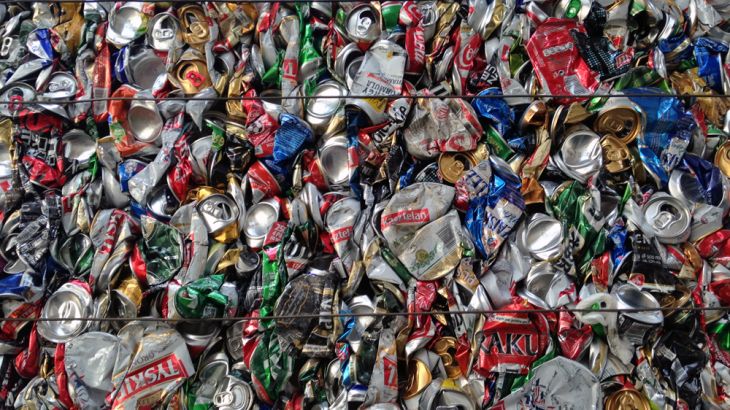
Unwasted Poland
Differently abled workers at a recycling facility in Poland struggle to face new challenges and acceptance.
At the EKON waste disposal and recycling plant on the outskirts of Warsaw, all of the workers are differently abled – suffering from varying conditions from mild learning difficulties to developed schizophrenia. The employees collect the rubbish from 60,000 flats and sort recyclable material at the factory.
The factory has run successfully as a company for 20 years. Many of its workers would find it hard, if not impossible to find other jobs.
Keep reading
list of 4 itemsIn India’s richest state, exam scams kill escape from farm crisis
Displaced 12-year-old boy becomes Gaza’s youngest medic
Why are so many young Americans suffering from mental distress?
The work done here provides a necessary service to the community, but it also helps to restore the self-confidence of employees, giving them a sense of purpose, companionship and allowing them to earn a wage while contributing to society.
However, the future of the company and its employees is now in jeopardy as the company battles market forces in tricky economic times.
![EKON's waste recycling business has run as a successful social enterprise for 20 years [Al Jazeera]](/wp-content/uploads/2015/05/1dbfec83ce8c46b5bd7c154730c909d8_18.jpeg)
FILMMAKER’S VIEW
By Oliver Englehart
EKON’s waste recycling business has run as a successful social enterprise for 20 years, collecting and sorting the recycling from an area made up of 60,000 Warsaw flats. This, however, is no ordinary business; everybody that works here is differently abled.
Their conditions vary from mental health challenges such as learning difficulties and autism through to psychiatric illnesses such as bipolar disorder and paranoid schizophrenia.
When I first got in touch with the management of EKON during the summer of 2013, the future of the company was in jeopardy. Due to a change in regulations, the contract to collect recyclable waste in EKON’s district of operation had gone out to tender and the company found itself unable to compete with the larger more profit-driven waste management companies.
![The management were desperate to save their marginalised workforce from the threat of further social exclusion and unemployment [Al Jazeera]](/wp-content/uploads/2015/05/6262e644637f42c88c8f222899de09ea_18.jpeg)
The management cared deeply about their staff and were desperate to save their marginalised workforce from the threat of further social exclusion and unemployment, but the spectre of being forced to sack 200 differently abled employees loomed over the company.
The subject of this documentary – differently abled workers facing mass dismissal from a waste recycling factory – might sound like a gloomy topic. But what I found when I got to Warsaw, was quite the opposite – not only was it visually arresting, colourful and laden with metaphor; differently abled people sorting recyclable materials from a conveyer belt of waste – it was also a heart-warming place with a wonderful atmosphere.
The workers earned a wage while providing a necessary service to the community, but EKON also provided a real sense of purpose and companionship to this group of people. The quality of the recycling product was also extremely effective but nevertheless the factory remained under threat from market forces.
![The employees suffer from mental health challenges such as learning difficulties and autism through to psychiatric illnesses such as bipolar disorder and paranoid schizophrenia [Al Jazeera]](/wp-content/uploads/2015/05/612bcd6bc75245d49e158e87c5ecfe92_18.jpeg)
On the first filming trip to Warsaw, I also met Malgorzata and Konrad, who had met on the sorting line of the factory, fallen in love and got engaged. Malgorzata would not marry Konrad, however, until he paid off his debts. Unfortunately, one of the reasons Konrad is in debt is because he took out a loan to pay for Malgorzata’s engagement rings (the first one fell off her finger at work and disappeared off down the sorting line).
The question of whether or not the lovebirds will tie the knot became a bit of a romantic comedy sub-plot to the fate of the factory and its workers. I also hoped it would help to show some of the bigger picture from their lives and relationships outside of the workplace.
I did hope, like in all good endings, that the couple would finally overcome the odds and get married, but this is documentary, and sadly their circumstances and challenges arising from special needs have thus far continued to conspire against them.
![In 2013, the factory had about 400 employees and now there are only about 220 [Al Jazeera]](/wp-content/uploads/2015/05/145b3e78c76746e7b83fb5843c55e176_18.jpeg)
As for the factory, despite the best efforts of the management, the scope of the waste recycling business was reduced threefold. In 2013 they had about 400 employees and now there are only about 220. They have, however, held on to a contract to continue their operations, albeit in a diminished capacity, until 2017. EKON is now searching for new opportunities both in recycling and in other areas where they can continue vocational rehabilitation of the differently abled.
While filming observational documentary with a vulnerable group of people requires extra sensitivity and care, the differently abled are too often not given a voice at all, pushed to one side of society, overlooked and underrepresented. While the subject matter may sound bleak, this was not the situation I found or wanted to reflect on in this film.
I hope there is a lightness of touch to this documentary which reflects the genuine warmth, humour and humanity of its protagonists. Despite their mental ailments and in the face of great adversity, the people featured in this Witness have the same relationships, hopes, dreams and fears as everyone else.